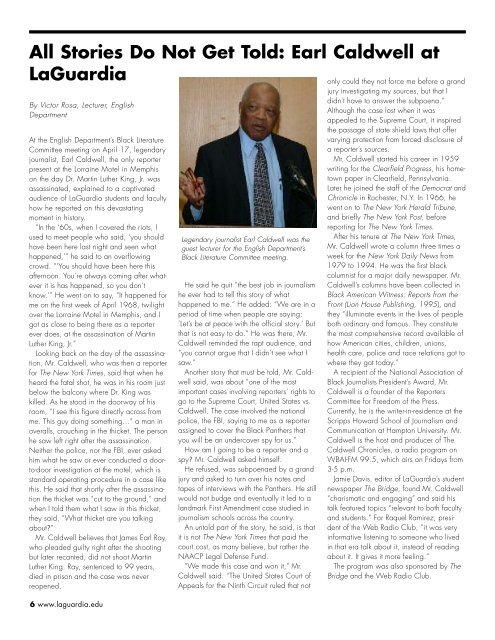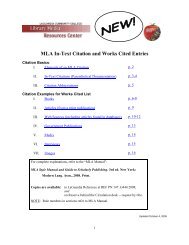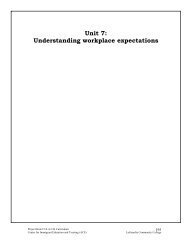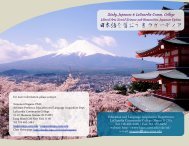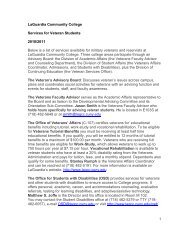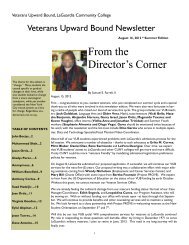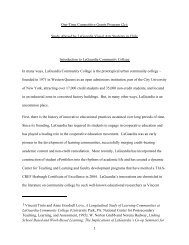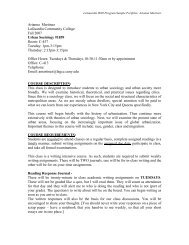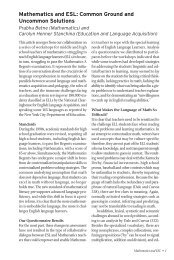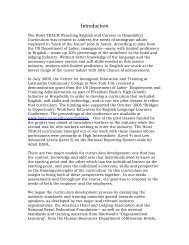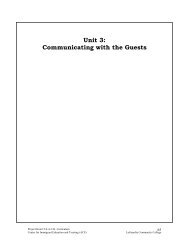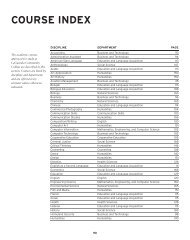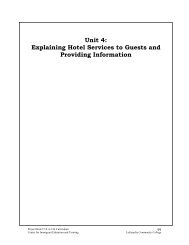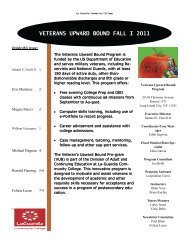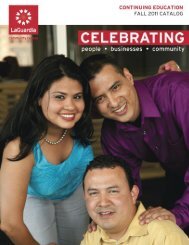LiveWire 68 - LaGuardia Community College - CUNY
LiveWire 68 - LaGuardia Community College - CUNY
LiveWire 68 - LaGuardia Community College - CUNY
Create successful ePaper yourself
Turn your PDF publications into a flip-book with our unique Google optimized e-Paper software.
All Stories Do Not Get Told: Earl Caldwell at<br />
<strong>LaGuardia</strong><br />
only could they not force me before a grand<br />
jury investigating my sources, but that I<br />
By Victor Rosa, Lecturer, English<br />
Department<br />
At the English Department’s Black Literature<br />
Committee meeting on April 17, legendary<br />
journalist, Earl Caldwell, the only reporter<br />
present at the Lorraine Motel in Memphis<br />
on the day Dr. Martin Luther King, Jr. was<br />
assassinated, explained to a captivated<br />
audience of <strong>LaGuardia</strong> students and faculty<br />
how he reported on this devastating<br />
moment in history.<br />
“In the ‘60s, when I covered the riots, I<br />
used to meet people who said, ‘you should<br />
have been here last night and seen what<br />
happened,’” he said to an overflowing<br />
crowd. “’You should have been here this<br />
afternoon. You’re always coming after whatever<br />
it is has happened, so you don’t<br />
know.’” He went on to say, “It happened for<br />
me on the first week of April 19<strong>68</strong>, twilight<br />
over the Lorraine Motel in Memphis, and I<br />
got as close to being there as a reporter<br />
ever does, at the assassination of Martin<br />
Luther King, Jr.”<br />
Looking back on the day of the assassination,<br />
Mr. Caldwell, who was then a reporter<br />
for The New York Times, said that when he<br />
heard the fatal shot, he was in his room just<br />
below the balcony where Dr. King was<br />
killed. As he stood in the doorway of his<br />
room, “I see this figure directly across from<br />
me. This guy doing something…” a man in<br />
overalls, crouching in the thicket. The person<br />
he saw left right after the assassination.<br />
Neither the police, nor the FBI, ever asked<br />
him what he saw or ever conducted a doorto-door<br />
investigation at the motel, which is<br />
standard operating procedure in a case like<br />
this. He said that shortly after the assassination<br />
the thicket was “cut to the ground,” and<br />
when I told them what I saw in this thicket,<br />
they said, “What thicket are you talking<br />
about?”<br />
Mr. Caldwell believes that James Earl Ray,<br />
who pleaded guilty right after the shooting<br />
but later recanted, did not shoot Martin<br />
Luther King. Ray, sentenced to 99 years,<br />
died in prison and the case was never<br />
reopened.<br />
6 www.laguardia.edu<br />
Legendary journalist Earl Caldwell was the<br />
guest lecturer for the English Department’s<br />
Black Literature Committee meeting.<br />
He said he quit “the best job in journalism<br />
he ever had to tell this story of what<br />
happened to me.” He added: “We are in a<br />
period of time when people are saying:<br />
’Let’s be at peace with the official story.‘ But<br />
that is not easy to do.” He was there, Mr.<br />
Caldwell reminded the rapt audience, and<br />
“you cannot argue that I didn’t see what I<br />
saw.”<br />
Another story that must be told, Mr. Caldwell<br />
said, was about “one of the most<br />
important cases involving reporters’ rights to<br />
go to the Supreme Court, United States vs.<br />
Caldwell. The case involved the national<br />
police, the FBI, saying to me as a reporter<br />
assigned to cover the Black Panthers that<br />
you will be an undercover spy for us.”<br />
How am I going to be a reporter and a<br />
spy? Mr. Caldwell asked himself.<br />
He refused, was subpoenaed by a grand<br />
jury and asked to turn over his notes and<br />
tapes of interviews with the Panthers. He still<br />
would not budge and eventually it led to a<br />
landmark First Amendment case studied in<br />
journalism schools across the country.<br />
An untold part of the story, he said, is that<br />
it is not The New York Times that paid the<br />
court cost, as many believe, but rather the<br />
NAACP Legal Defense Fund.<br />
“We made this case and won it,” Mr.<br />
Caldwell said. “The United States Court of<br />
Appeals for the Ninth Circuit ruled that not<br />
didn’t have to answer the subpoena.”<br />
Although the case lost when it was<br />
appealed to the Supreme Court, it inspired<br />
the passage of state shield laws that offer<br />
varying protection from forced disclosure of<br />
a reporter’s sources.<br />
Mr. Caldwell started his career in 1959<br />
writing for the Clearfield Progress, his hometown<br />
paper in Clearfield, Pennsylvania.<br />
Later he joined the staff of the Democrat and<br />
Chronicle in Rochester, N.Y. In 1966, he<br />
went on to The New York Herald Tribune,<br />
and briefly The New York Post, before<br />
reporting for The New York Times.<br />
After his tenure at The New York Times,<br />
Mr. Caldwell wrote a column three times a<br />
week for the New York Daily News from<br />
1979 to 1994. He was the first black<br />
columnist for a major daily newspaper. Mr.<br />
Caldwell’s columns have been collected in<br />
Black American Witness: Reports from the<br />
Front (Lion House Publishing, 1995), and<br />
they “illuminate events in the lives of people<br />
both ordinary and famous. They constitute<br />
the most comprehensive record available of<br />
how American cities, children, unions,<br />
health care, police and race relations got to<br />
where they got today.”<br />
A recipient of the National Association of<br />
Black Journalists President’s Award, Mr.<br />
Caldwell is a founder of the Reporters<br />
Committee for Freedom of the Press.<br />
Currently, he is the writer-in-residence at the<br />
Scripps Howard School of Journalism and<br />
Communication at Hampton University. Mr.<br />
Caldwell is the host and producer of The<br />
Caldwell Chronicles, a radio program on<br />
WBAI-FM 99.5, which airs on Fridays from<br />
3-5 p.m.<br />
Jamie Davis, editor of <strong>LaGuardia</strong>’s student<br />
newspaper The Bridge, found Mr. Caldwell<br />
“charismatic and engaging” and said his<br />
talk featured topics “relevant to both faculty<br />
and students.” For Raquel Ramirez, president<br />
of the Web Radio Club, “it was very<br />
informative listening to someone who lived<br />
in that era talk about it, instead of reading<br />
about it. It gives it more feeling.”<br />
The program was also sponsored by The<br />
Bridge and the Web Radio Club.


